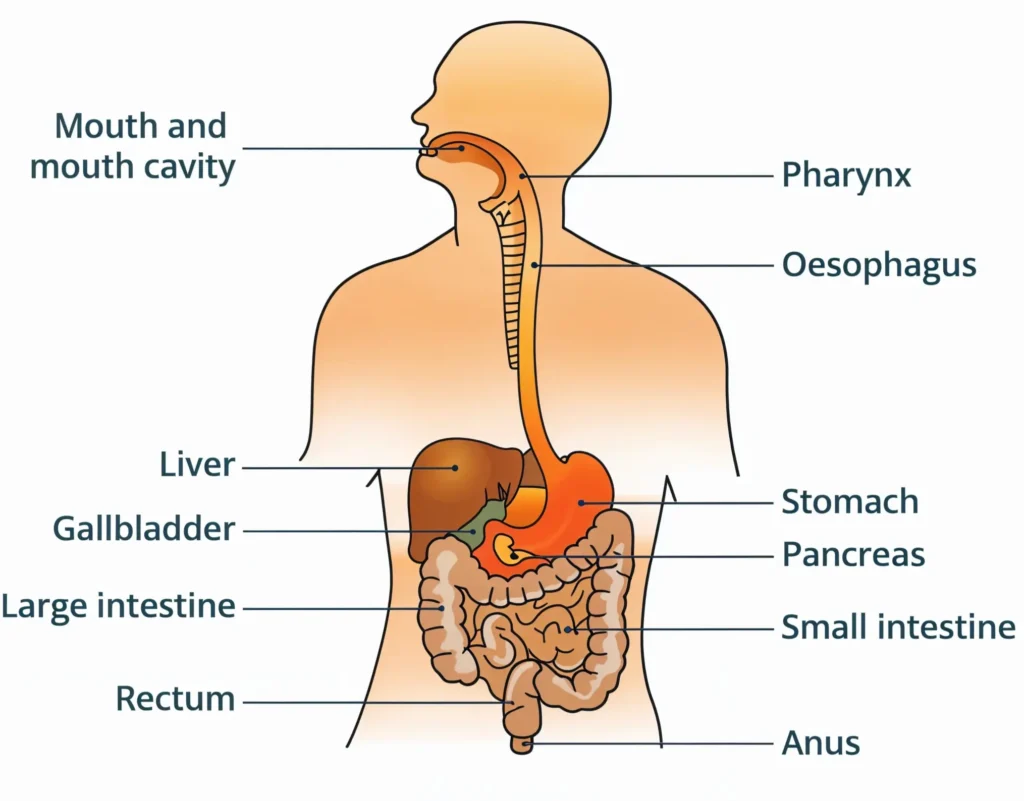The human body is a marvel, and one of its most vital processes is digestion. Understanding how the digestive system works can help you appreciate what happens every time you eat, and how your body converts food into energy. This system plays an essential role in keeping us healthy and strong. In this post, we’ll explore the digestive process in detail, covering everything from the organs involved to potential disorders.
What’s the Digestive System?
The digestive system is a group of organs working together to convert the food you eat into energy and nutrients. From the moment food enters your mouth, it starts a journey through various organs, each contributing to breaking down the food into simpler forms like proteins, fats, and carbohydrates. These nutrients are then absorbed into your bloodstream to fuel your body.

How the Digestive System Works?
You may wonder, how the digestive system works? In simple terms, it starts with chewing food in your mouth, where saliva begins the breakdown process. The food then travels through the esophagus into the stomach, where powerful acids and enzymes work to break it down further. Afterward, it moves into the intestines, where nutrients are absorbed, and the remaining waste is prepared for elimination.
The stomach and intestines work together efficiently. The stomach is responsible for churning and breaking down food, while the intestines absorb nutrients and expel waste. Understanding how does digestion work is crucial for realizing why keeping your digestive system healthy is important.
Digestive System Function
The digestive system has two main functions:
- Breaking down food: The process starts in the mouth, moves through the esophagus, stomach, small and large intestines, and ends in the rectum. Enzymes and acids break down food into nutrients.
- Absorbing nutrients: After breaking down food, the intestines absorb these nutrients into the bloodstream. Nutrients include proteins, fats, carbohydrates, vitamins, and minerals, all of which help your body function properly.
This process explains how does a healthy digestive system work, keeping your body nourished and functioning well.
Digestive System Organs
The digestive system involves several organs, each playing a vital role in breaking down food lets see how do intestine and stomach work together:
- Mouth: Digestion starts here when you chew food.
- Esophagus: A tube that transports food from the mouth to the stomach.
- Stomach: Produces acids and enzymes that digest food.
- Small Intestine: Absorbs nutrients from the food.
- Large Intestine: Absorbs water and turns waste into stool.
- Rectum and Anus: Eliminates waste from the body.
Each of these organs works together, so when you’re curious about how do intestine and stomach work together, this is the process that ensures food is digested efficiently.
Accessory Digestive System Organs
In addition to the primary organs, there are other organs known as accessory digestive organs that aid in the digestion process:
- Liver: Produces bile, which helps digest fats.
- Gallbladder: Stores bile and releases it into the small intestine.
- Pancreas Diseases: Produces enzymes that break down proteins, fats, and carbohydrates.
These organs do not have direct contact with the food but play a huge role in ensuring digestion happens smoothly. Their collaboration ensures how does a healthy digestive system work effectively.
Conditions and Disorders
Unfortunately, the digestive system can face various issues that affect its function. Some common digestive system conditions include:
- Acid reflux: Stomach acid flows back into the esophagus, causing heartburn.
- Irritable bowel syndrome (IBS): Causes symptoms like cramping, bloating, and diarrhea.
- Constipation: Difficulty in passing stools due to slow digestion.
- Lactose intolerance: The inability to digest lactose, a sugar found in dairy.
Understanding how the digestive system works can help you recognize and manage these conditions, ensuring you seek timely medical advice.

Prevention
Maintaining and understanding how the digestive system works is key to preventing disorders. Here are some simple ways to keep it functioning well:
- Eat a balanced diet: High-fiber foods help with digestion.
- Stay hydrated: Water aids in digestion and keeps everything moving smoothly.
- Exercise regularly: Physical activity helps stimulate digestion.
- Limit fatty foods: These can slow down digestion and cause discomfort.
Taking these preventive measures can help keep your digestive system in top shape, making sure how does digestion work optimally.
Digestive System Diseases
Several diseases affect the digestive system, including:
- Crohn’s disease: An inflammatory bowel disease that causes chronic inflammation.
- Celiac disease: A reaction to gluten that damages the small intestine.
- Ulcers: Open sores that can form in the stomach or intestines.
If you experience ongoing digestive discomfort, it’s important to consult a doctor. Deepa Hospital specializes in digestive system care and can provide you with more information about how the digestive system works on managing these diseases.
Takeaways
- The digestive system breaks down food into nutrients and removes waste.
- The stomach and intestines work together to process food efficiently.
- Enzymes and acids play a crucial role in digesting food.
- Healthy habits like eating fiber-rich foods and drinking water help maintain a healthy digestive system.
- If you’re experiencing digestive problems, don’t ignore them—seek medical advice.
Conclusion
Understanding how the digestive system works is important for maintaining good health. The digestive system plays a crucial role in breaking down food, absorbing nutrients, and removing waste. By keeping it healthy through a balanced diet and regular exercise, you can avoid many digestive disorders. If you’re facing issues with your digestive system, contact Deepa Hospital today for a consultation. Their experts can provide you with personalized advice and treatment options to ensure your digestive system works properly.

